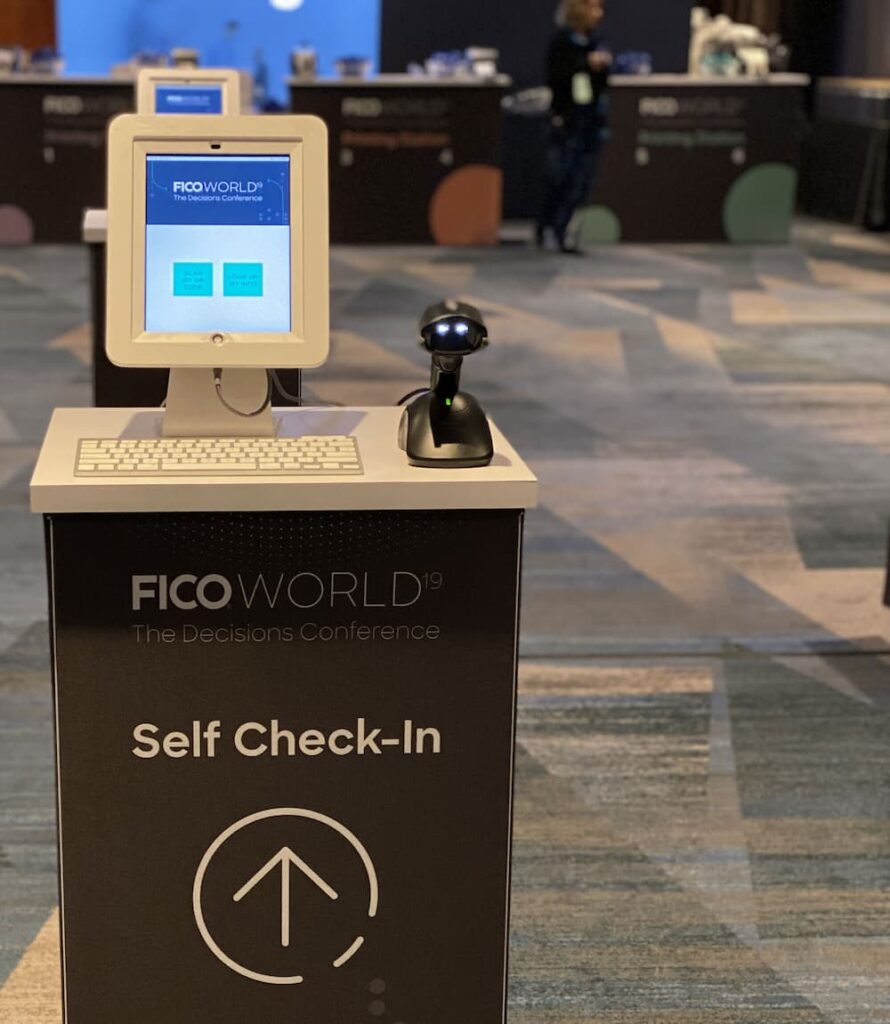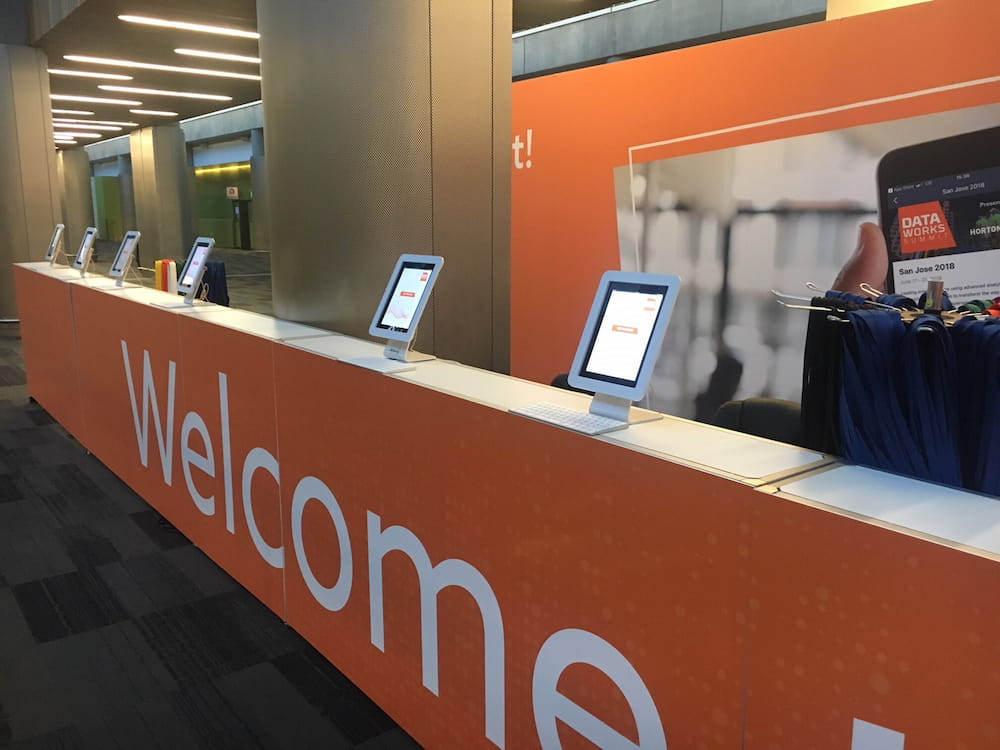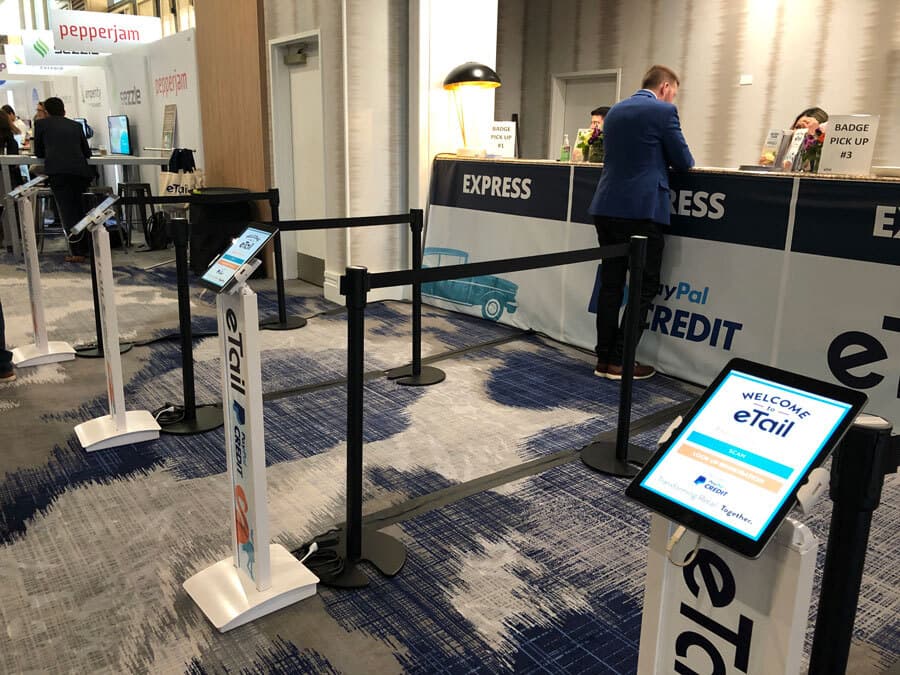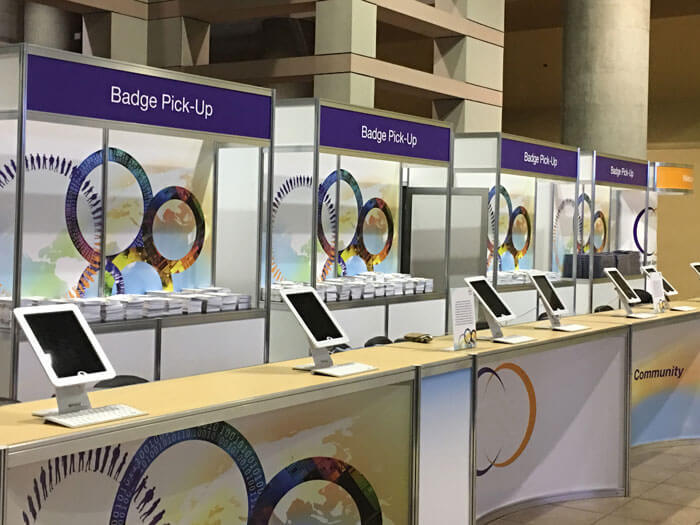Efficiency and attendee satisfaction need to be priorities for event organizers. As event technology has progressed, attendees expect their registration and check-in process to be quick and easy.
Event check-in kiosks have now become the standard for most large events. These self-service stations offer a streamlined, efficient, and user-friendly way for event attendees to check in, significantly enhancing the overall event experience.
Not including them as part of your event plan can lead to a troublesome brand image and poor attendee satisfaction.
What are Event Check-in Kiosks?

Event check-in kiosks are automated, self-service stations designed to facilitate the check-in process at various events, from conferences and trade shows to concerts and sports events. These kiosks allow attendees to register their arrival quickly and efficiently, often with just a few taps on a touchscreen.
Kiosks reduce the burden on staff, minimize human error during the check-in process, and provide real-time data on attendee arrivals.
For your attendees, the kiosks offer a quick, convenient, and often contactless way to check in, reducing wait times and improving their overall event experience.
Advantages of Using Check-in Kiosks for Events
Event check-in kiosks offer numerous advantages that will improve the efficiency and overall success of your event. Let’s explore these benefits in detail.
Efficiency and Speed
Nobody looks forward to waiting in a line.
One of the most stark advantages of using check-in kiosks is the enhanced efficiency and speed they bring to the event check-in process.
Traditional check-in methods, which often involve long queues and manual data entry, can be time-consuming and prone to errors.
In contrast, kiosks streamline the process, allowing attendees to check in quickly with just a few taps. This not only reduces wait times but also ensures a smoother flow of attendees into the event.
Improved Attendee Experience
With a self-service option, your event attendees can avoid the frustration of long lines and enjoy a more personalized and efficient check-in process.
Kiosks are designed to be intuitive and user-friendly, making it easy for attendees of all ages and tech-savviness to use.
This reduced friction at check-in can lead to higher attendee satisfaction for your event.
Data Accuracy and Management
Data is gold for event organizers.
Using check-in kiosks provides improvement in data accuracy and management. Manual data entry methods are susceptible to human error, which can lead to inaccuracies in critical attendee information.
Kiosks, however, automate the data collection process, ensuring that the information captured is accurate and up-to-date.
This is particularly beneficial for event organizers, as it allows for better tracking of attendee numbers, demographics, and preferences, facilitating more informed decision-making and personalized engagement strategies.

Must Have Features of Event Check-in Kiosks
Event check-in kiosks are equipped with a range of features designed to enhance the check-in process and improve overall event management. Here, we delve into the essential features that make these kiosks a valuable addition to any event.
Well-designed User Interface and Experience
A well-designed user interface is crucial for the success of any event check-in kiosk. These kiosks are typically equipped with touchscreens that are easy to navigate, ensuring a smooth and hassle-free check-in process for attendees.
The user interface is designed to be intuitive, with clear instructions and simple steps that guide attendees through the check-in process.
This user-friendly design minimizes confusion and maximizes efficiency, catering to a wide range of attendees, including those who may not be tech-savvy.
Integration Capabilities
Integration with other event management software is a key feature of modern check-in kiosks. These kiosks can seamlessly synchronize with attendee databases, registration systems, payment gateways, and other event management tools.
This integration ensures that all your attendee information is up-to-date and consistent across different platforms, making it easier for you to manage.
Additionally, kiosks can integrate with badge printing systems, allowing attendees to print their name badges on the spot, further streamlining the check-in process.
Security Measures
Security is always a concern when it comes to handling attendee information. Data breaches are terrible for attendees and your brand image.
Event check-in kiosks are equipped with robust security features to protect sensitive data. This includes encryption of personal information, secure login protocols, and measures to prevent unauthorized access.
By ensuring that all data collected is stored and transmitted securely, kiosks help maintain the privacy and trust of attendees.
Additionally, some kiosks may include features like facial recognition or QR code scanning to enhance security and speed up the check-in process.
Types of Event Check-in Kiosks
Event check-in kiosks come in various types, each designed to meet specific needs and preferences of different events. Understanding these types can help organizers choose the most suitable option for their events.
Self-service Kiosks
Self-service check-in kiosks are designed to allow attendees to check themselves in without the need for staff assistance. These kiosks are particularly beneficial for large events with high attendee numbers, as they can significantly reduce wait times and streamline the check-in process.
Benefits of Self-service Check-in
Self-service kiosks are typically equipped with touchscreens, barcode scanners, or RFID readers, enabling attendees to quickly scan their tickets or input their registration details.
The primary benefit of self-service kiosks is their ability to handle large volumes of attendees efficiently, reducing congestion and wait times.
These kiosks provide a contactless check-in option, which is increasingly important for health and safety considerations.
Suitable Event Types for Self-service Kiosks
- Large-scale conferences and trade shows
- Music festivals and concerts
- Sports events and marathons
- Corporate events and exhibitions
Staff-assisted Kiosks
Staff-assisted check-in kiosks combine the convenience of kiosk technology with the personal touch of human assistance.
These kiosks are ideal for events where attendees might need additional help or where a more personalized check-in experience is desired.
How Staff-assisted Kiosks Operate
These kiosks are typically manned by event staff who guide attendees through the check-in process.
Staff can assist with troubleshooting any issues that arise, such as problems with ticket scanning or registration details.
This approach ensures that attendees who may not be comfortable using self-service technology still have a smooth and efficient check-in experience.
Scenarios Where Staff Assistance is Beneficial
- High-end or VIP events where personalized service is expected
- Events with older attendees who might not be as tech-savvy
- Situations where complex check-in requirements need to be managed

Setting Up Event Check-in Kiosks
Proper planning and setup of event check-in kiosks are essential to ensure they function effectively and provide a seamless check-in experience for attendees. This section outlines the key steps and considerations for setting up these kiosks.
Planning and Preparation
Effective planning and preparation are critical to the successful deployment of check-in kiosks. Here are the essential steps:
1. Determine Location
Assess the event venue thoroughly to determine the most suitable locations for kiosk placement. Consider high-traffic areas such as entrances, registration desks, and lobby spaces. Ensure that the chosen locations are easily accessible and visible to attendees.
2. Figure Out How Many Kiosks are Needed
Estimate the number of kiosks required based on the expected number of attendees and the anticipated check-in traffic. It’s advisable to have a sufficient number of kiosks to avoid long queues and ensure a smooth check-in process.
3. Verify Compatibility with Event Management Software
Verify that the kiosks are compatible with your event’s registration system, software tools, and any other technology being used for check-in and attendee management. Ensure that the necessary integrations and configurations are in place.
4. Ensure Kiosk Setup is Part of Your Event Plan
Develop a detailed timeline for kiosk setup, including the allocation of time for installation, testing, and troubleshooting. Aim to have all kiosks set up and fully operational well before the event starts.
5. Know Your Power Needs
Evaluate the power requirements of the kiosks and ensure that there are adequate power outlets in the selected locations. If necessary, arrange for power strips or extension cords to provide sufficient power supply.
6. Confirm Network Connectivity
Assess the internet connectivity at the venue, as reliable and stable internet access is crucial for the proper functioning of check-in kiosks. Ensure that the venue provides robust Wi-Fi or wired internet connections in the areas where kiosks will be placed.
7. Create a Tech Support Plan
Plan for on-site technical support during the event to address any potential issues or troubleshoot kiosk malfunctions promptly. Assign dedicated staff or engage with the venue’s IT personnel to ensure timely assistance.
8. Have a Check-in Backup Plan
Develop a contingency plan in case of technical difficulties or unexpected situations that may arise during the event. Have backup procedures in place, such as manual check-in options or alternative registration methods.
9. Test Your Kiosks
Conduct a trial run with a small group of users to simulate the check-in process and identify any potential problems. Ensure all staff that will be assisting with your event check-in are familiar with the kiosks and have had an opportunity to use them so they can properly help your attendees on the day of the event.
Event Check-in Kiosk Best Practices
Optimize Your Kiosk Placement
Strategic placement of check-in kiosks is crucial for their optimal use. Properly positioned kiosks can help manage attendee flow and minimize congestion. Place kiosks at entrances and registration areas where attendees are most likely to arrive.
Ensure that kiosks are spread out to prevent bottlenecks and facilitate easy access. Consider placing kiosks near information desks or help centers where attendees can get assistance if needed.
For large venues, distribute kiosks evenly across multiple entry points. In smaller venues, position kiosks in central, easily visible locations. For outdoor events, ensure kiosks are weatherproof or placed under protective coverings.
Provide Clear Instructions for Staff and Attendees
Proper training is essential to ensure that both event staff and attendees can effectively use the check-in kiosks. Provide comprehensive training sessions for staff on how to operate the kiosks and troubleshoot common issues.
Equip staff with knowledge on how to guide attendees through the check-in process and resolve any difficulties they might encounter. Ensure that there is sufficient staff coverage at all kiosk locations to assist attendees promptly.
Communicate with attendees before the event to inform them about the check-in process using kiosks. Provide clear instructions and signage at the event to guide attendees to the kiosks and explain how to use them.
Use multiple channels, such as emails, event websites, and social media, to share information about the check-in process.
Know How to Troubleshoot Technical Issues in Advance
Despite thorough planning and setup, technical issues can still arise with event check-in kiosks. Being prepared to troubleshoot these problems is essential to maintaining a smooth check-in process.
Common technical problems include connectivity issues, software malfunctions, and hardware failures. Ensure that kiosks are properly connected to the network and have backup mobile hotspots available in case of Wi-Fi failures.
Regularly update the kiosk software to prevent bugs and glitches, and restart the kiosk if it becomes unresponsive. Keep spare hardware components, such as touchscreens and barcode scanners, to replace any malfunctioning parts quickly.
Perform regular maintenance checks on all kiosks before and during the event. Keep all software up to date and ensure that kiosks are cleaned and inspected for any physical damage. Schedule periodic testing sessions to identify and resolve potential issues before they impact attendees.
Expect User-related Issues
Sometimes, issues may arise due to user errors or misunderstandings. Provide clear, step-by-step instructions on the kiosks to guide users through the check-in process. Design the user interface to be as intuitive and straightforward as possible, reducing the likelihood of errors.
Offer on-screen troubleshooting tips for common problems, such as incorrect data entry or failed ticket scans. Station knowledgeable staff near the kiosks to assist attendees and resolve any issues quickly.
Make sure staff are easily identifiable and approachable, so attendees feel comfortable asking for help. You should consider setting up a help desk or information point close to the kiosks where attendees can go for additional support if they have problems during their check-in
Closing Thoughts
Event check-in kiosks are revolutionizing the way events are managed, offering numerous benefits that enhance both efficiency and attendee satisfaction. Incorporating check-in kiosks into your event management strategy can lead to a more streamlined and enjoyable experience for all involved
A2Z Events offers the best event check-in kiosk solutions on the market. With over 20 years of event management experience, we can guide you in setting up a powerful and efficient event check-in experience with our on-site support experts.
Contact us today for a demo of A2Z’s Event Management solutions.







